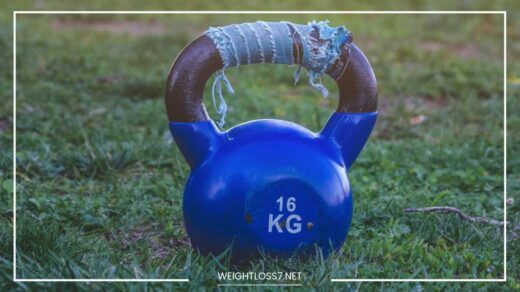Shedding Pounds, Not Myths: Weight Loss Mistakes Debunked

Weight Loss Mistakes
Shedding Pounds, Not Pitfalls: Common Weight Loss Mistakes to Avoid
Let’s face it, we’ve all been there. The desire to transform our bodies and feel our best sparks a journey of diet and exercise. But sometimes, despite our best efforts, the numbers on the scale refuse to budge. Frustration sets in, and we might be tempted to blame ourselves.
But hold on! Before you throw in the towel, consider if you might be falling victim to some common weight loss mistakes.
In this comprehensive guide, we’ll unveil the top pitfalls that can derail your weight loss goals and equip you with the knowledge to navigate around them. We’ll delve deeper into the science behind these mistakes and explore practical solutions to keep you on track for sustainable weight management.
Mistake #1: Crash Dieting and Calorie Obsession: The Science and Solutions
Crash diets with severe calorie restrictions might lead to quick weight loss initially, but they’re a recipe for disaster. Our bodies need a certain amount of calories to function properly. These calories fuel our organs, regulate body temperature, and even support brain function.
When we restrict calories too much, our metabolism slows down in an attempt to conserve energy. This makes it harder to burn calories and lose weight in the long run.
The Science Behind the Slowdown: Our bodies are finely tuned survival machines. When calorie intake plummets, the body interprets it as a potential famine. As a response, the levels of leptin, a hormone that signals satiety, decrease.
Meanwhile, ghrelin, the hunger hormone, increases, making us crave high-calorie foods. Additionally, the body starts to break down muscle tissue for fuel, further reducing our metabolic rate.
Solution: Instead of crash diets, focus on a balanced approach with a moderate calorie deficit. This deficit creates a small gap between the calories you consume and the calories you burn, leading to gradual, sustainable weight loss.
Consulting a healthcare professional or a registered dietitian is crucial. They can determine a safe and effective calorie goal for you based on your individual factors like age, weight, activity level, and overall health.
Mistake #2: Skipping Meals or Not Eating Enough Protein: The Hunger Pangs and Muscle Myth
Skipping meals might seem like a shortcut to fewer calories, but it backfires. Here’s why: Skipping meals, especially breakfast, disrupts your body’s natural hunger-satiety cycle.
This leads to increased hunger pangs later in the day, making you more susceptible to overeating at your next meal.
The Protein Powerhouse: Protein is particularly crucial for weight loss. It keeps you feeling fuller for longer due to its satiating properties. Protein also helps build and maintain muscle mass. Muscle tissue burns more calories at rest, even when you’re not actively exercising.
This phenomenon is known as the thermic effect of food (TEF). The TEF of protein is higher compared to carbohydrates and fats, further boosting your metabolism.
Solution: Develop a regular eating pattern that includes three meals and healthy snacks throughout the day. Prioritize protein sources like lean meats, fish, beans, lentils, eggs, and nuts in your diet.
Aim to include a source of protein in every meal and snack to keep yourself feeling satisfied and support muscle growth.
Mistake #3: Fad Diets and Magical Thinking: The Allure and the Risks
The internet is overflowing with fad diets promising rapid weight loss with minimal effort. These diets often eliminate entire food groups like carbohydrates or fats, or rely on unconventional practices like juice cleanses or ketone supplements.
While these approaches might lead to some initial weight loss, they raise red flags for several reasons.
Nutrient Deficiencies: Eliminating entire food groups can lead to nutrient deficiencies. Our bodies need a variety of vitamins, minerals, and other essential nutrients to function properly.
Restricting certain food groups can make it difficult to obtain these necessary nutrients, potentially leading to health problems like fatigue, hair loss, and weakened immunity.
Unsustainable and Unhealthy: Fad diets are often restrictive and lack long-term sustainability. Following a restrictive diet might feel manageable in the short term, but the lack of variety and potential for deprivation can lead to cravings and binge eating later on.
Additionally, some fad diets can promote unhealthy practices like excessive exercise or laxative use, which can be harmful to your health.
The Magical Thinking Trap: Remember, there’s no magic bullet for weight loss. Sustainable weight management requires a healthy lifestyle change, not a quick fix.
Fad diets often prey on our desire for instant results, but they don’t address the underlying factors that contribute to weight gain in the first place.
Solution: Steer clear of fad diets. Focus on adopting healthy habits you can maintain for life, such as incorporating more fruits, vegetables, and whole grains into your diet.
Aim for a balanced approach that prioritizes whole, unprocessed foods over restrictive trends, for a sustainable weight loss journey you can enjoy.
Mistake #4: Demonizing Carbs and Healthy Fats: The Carbs vs. Keto Conundrum
Carbs aren’t the enemy! Our bodies rely on carbohydrates for energy. Complex carbohydrates, found in whole grains, fruits, and vegetables, are a slow-burning source of fuel. They help regulate blood sugar levels and keep you feeling energized throughout the day.
The Truth About Carbs: Many fad diets demonize carbs, particularly those that promote a ketogenic (keto) diet. While the keto diet can be effective for weight loss in some cases, it’s important to understand its limitations.
The keto diet drastically reduces carbohydrate intake and forces the body to rely on fat for energy through a process called ketosis. While ketosis can lead to weight loss, it can also cause side effects like fatigue, headaches, and bad breath.
Additionally, the keto diet is restrictive and may not be suitable for everyone, especially those with certain health conditions.
Healthy Fats – Friend or Foe? Similarly, healthy fats have been demonized in the past. However, healthy fats like those found in avocados, nuts, olive oil, and fatty fish are essential for our health.
They play a role in hormone regulation, cell function, and satiety. Healthy fats can help you feel full and satisfied, reducing cravings and promoting portion control.
Solution: Choose complex carbs over refined carbs like white bread, pastries, and sugary cereals. Focus on incorporating whole grains, fruits, and vegetables into your diet for sustained energy and essential nutrients.
Include healthy fats in your diet in moderation. Opt for sources like avocados, nuts, olive oil, fatty fish, and flaxseeds.
Mistake #5: Liquid Calories Don’t Count (They Do!): The Smoothie Deception
Sugary drinks, juices, and even seemingly healthy smoothies can be loaded with hidden calories. While they might fill you up temporarily, they often lack the fiber and protein that promote sustained fullness. These liquid calories can easily add up throughout the day, hindering your weight loss efforts.
The Smoothie Breakdown: Smoothies can be a healthy addition to your diet, but it’s crucial to be mindful of the ingredients.
Many store-bought smoothies or those from cafes can be loaded with added sugars, artificial flavors, and high-fructose corn syrup. These ingredients contribute to unwanted calorie intake and can spike blood sugar levels, leading to increased hunger pangs later.
Solution: Limit sugary drinks and prioritize water throughout the day. If you enjoy smoothies, make them yourself using whole fruits, vegetables, and a healthy source of protein like Greek yogurt or protein powder. This allows you to control the ingredients and ensure your smoothie is a nutritious and filling option.
Empowered by Knowledge: Avoiding Mistakes for Sustainable Success
Congratulations on taking the first step towards a healthier you! By understanding these common weight loss mistakes, you’re well-equipped to navigate your journey with confidence.
Remember, weight loss is a marathon, not a sprint. Embrace a balanced approach that prioritizes healthy habits over restrictive fads. Celebrate your non-scale victories, like increased energy levels or improved mood, alongside the numbers on the scale.
Here’s a quick recap of the mistakes we’ve covered:
- Crash Dieting and Calorie Obsession: Focus on a moderate calorie deficit and consult a healthcare professional for a personalized plan.
- Skipping Meals or Not Eating Enough Protein: Prioritize regular meals and snacks with protein sources for sustained satiety and muscle building.
- Fad Diets and Magical Thinking: Embrace sustainable lifestyle changes over quick fixes.
- Demonizing Carbs and Healthy Fats: Choose complex carbs and healthy fats for sustained energy and satiety.
- Liquid Calories Don’t Count (They Do!): Limit sugary drinks and be mindful of added sugars in smoothies.
Beyond the Basics: Embracing a Holistic Approach
This guide has equipped you with the knowledge to avoid common pitfalls. As you progress, consider exploring these additional aspects for a well-rounded approach:
- Portion Control: Use measuring cups or invest in portion-controlled containers to avoid overeating.
- Food Labels: Become a label-reading pro! Understand serving sizes and identify hidden sugars and unhealthy fats.
- Exercise Strategies: Combine cardio with strength training to boost metabolism and build muscle.
- Sleep Habits: Aim for 7-8 hours of quality sleep to regulate hormones and support weight loss efforts.
- Celebrate Non-Scale Victories: Track your progress beyond the scale. Celebrate improvements in energy levels, mood, strength, or clothing fit.
Remember, you’re not alone on this journey. There are countless resources available to support you. Consult a registered dietitian for personalized guidance, join a fitness community for motivation, or find a workout buddy for accountability.
With dedication, knowledge, and a positive mindset, you can achieve your weight loss goals and embrace a healthier, happier you!

















